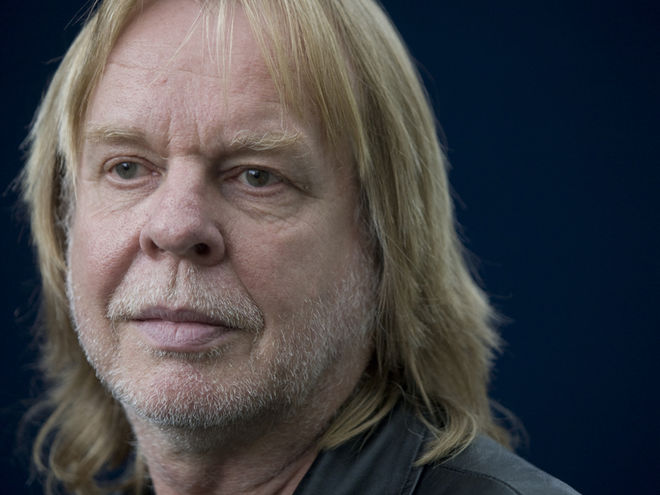“I learned an invaluable lesson from a kid in Argentina when we were playing Buenos Aires in 2002.” says former Yes man and all-round keyboard legend Rick Wakeman. “I came out of the hotel and this 16-year-old-boy asked me to sign his copy of my Six Wives of Henry VIII album. As I was signing it I asked him ‘what does a 16 year-old like about this old music?’ and he looked at me, quite hurt, and said, ‘it might be old to you, Mr Wakeman, but I only heard it for the first time last week. When you hear something for the first time, it’s new.’ I’ve never forgotten that.”
One of prog’s undisputed doyens, Wakeman’s contribution to the genre is immeasurable. Ever seeking to expand his sonic repertoire, Wakeman became a respected confidante and adviser of all the prime movers in early synthesizer development, which gave rise to an amazing piece of networking.
“My proudest moment was introducing Bob Moog to Katoh San [founder of synth behemoth Korg] at the Frankfurt music fair… it was like putting two lovers together!” Rick explains. “Neither of them could see their own importance in the synthesizer world; they were both famous in their own right whereas they both considered themselves quite insignificant.
“It was ridiculous: here were these two guys who changed the face of keyboards - and music in many respects - and they were terrified to meet one another as they thought the other wouldn’t be interested. Bless them - both no longer with us”
Classic Rock’s exclusive Fanpack release of Rick Wakeman’s re-recorded solo masterpiece, Journey To The Centre Of The Earth, was only made possible by another synchronicitous tale of a long-lost musical score found coupled with some intensive restoration work.
“The last performance, I think, was in 1979, and just after that I signed to MAM management, which later folded,” Rick tells us. “In about 1983 I got a request to tour Journey in South America. All my stuff had been in storage with MAM and we couldn’t locate any of it and were told most of the storage stuff had been skipped, which was horrendous.
“Back then, of course, everything was done by hand - the music was copied by hand - so what there was was all gone. I got asked numerous times over the years to perform Journey but we couldn’t do it.”
Surely a full-stop end to the story but, as Rick reveals, there was a happy ending.
“In 2008 a huge cardboard packing case arrived at the house, which sat in my garage for about five months before I took it out. It was full of music but none of it was mine. It was incredibly badly water-damaged but something made me keep going through it and the hairs on the back of my neck stood up when I reached the bottom and saw a grey, gaffa-taped cover that we’d put on the conductor’s score of Journey. I knew straight away what it was - I was, quite literally, shell-shocked.”
After passing the find on to friend and musicologist Guy Protheroe, there then followed almost a year’s worth of work to restore and digitise the score.
How was the original version of Journey to the Centre of the Earth recorded, though? Did Rick have a lot of studio gear to work with back in 1974?
“I did the whole demo on a Revox reel-to-reel, a Fender Rhodes with a Clavinet on top of it and a Mellotron at its side,” he recalls. “It was just a case of bouncing tracks on the Revox and doing a rough guide of what would be happening musically then adding a very rough vocal track myself and adding spoken guides like ‘narration 1 starts here’ on the tape.”
How does Rick feel, then, about the influence of prog and its recent resurgence? “I think the fact that, if you listen to the music from the ‘60s that prog followed on from, the songs then were very formatted. To a large extent it was ‘intro-verse-verse-chorus-verse-solo-chorus-fade-out’. All prog did was to say, “we’re not going to do that… we’re going to break the rules and if we feel like doing something, then we’re going to do it.
“What’s happened over the years is that there’s now a little bit of prog in almost everything. So it’s had an influence.”
Indeed it has, but which of the great prog rock albums does Rick Wakeman consider to be the best? You’re about to find out.



No comments:
Post a Comment